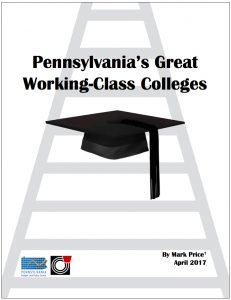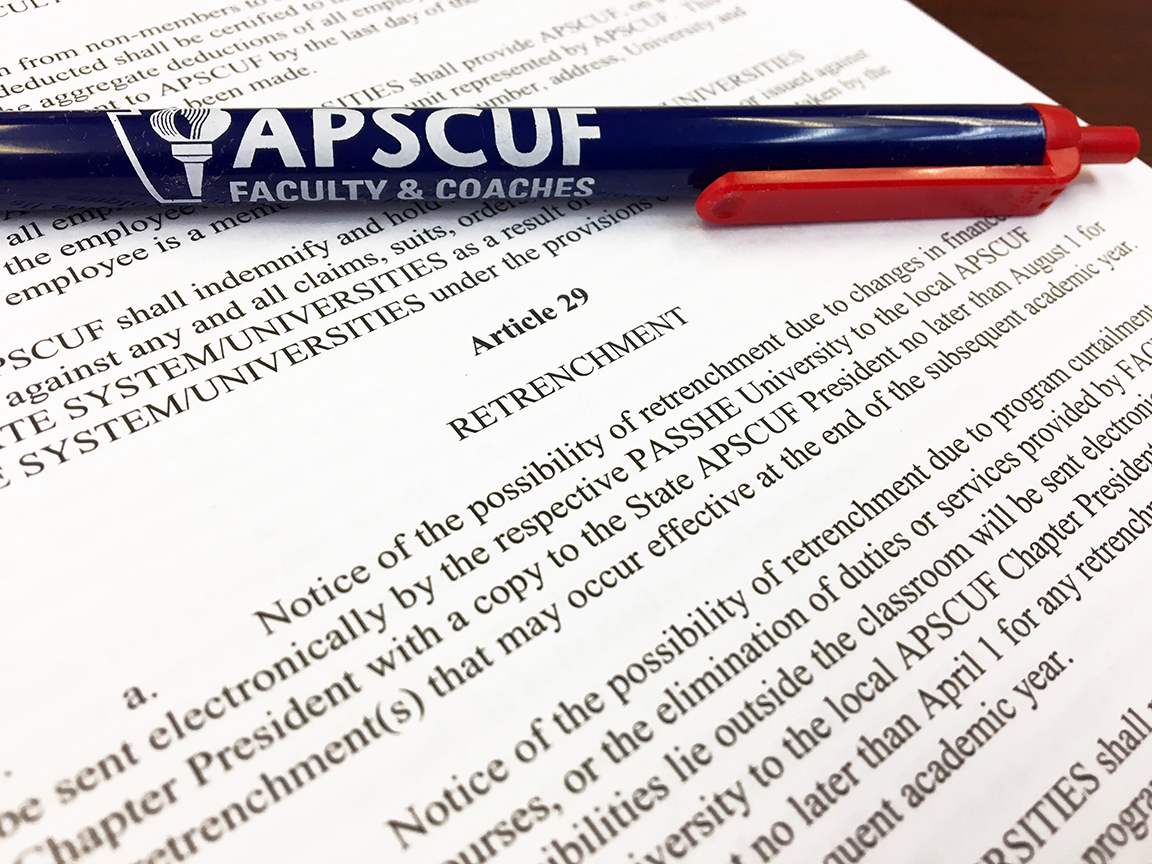Blog
APSCUF welcomes faculty intern from Slippery Rock University

We are delighted to have Nan Nicholls, an associate professor at Slippery Rock University, as our faculty intern this week. She will be in the Harrisburg office interacting with staff members and observing the spectrum of union administration. Click here to learn more about APSCUF’s faculty and coaches orientation internships.
State System schools are an engine for upward mobility
The Pennsylvania Budget and Policy Center and Keystone Research Center‘s report released last month shares the type of positive news about our universities that has been lacking in recent months. “Pennsylvania’s Great Working-Class Colleges,” is the first installment of several reports, and its author, Mark Price, showcases how Pennsylvania’s State System of Higher Education universities serve working-class families and help propel graduates to a brighter future.
 Providing our students with the best education possible — at an affordable price — is one of APSCUF’s core values.
Providing our students with the best education possible — at an affordable price — is one of APSCUF’s core values.
- BU is exceptional and affordable (login required) in the Bloomsburg Press Enterprise
- Preserve state schools on TribLive
- Edinboro gave Saegertown man excellent foundation on GoErie.com
- Kutztown University delivers for students (login required) in the Reading Eagle
- State universities in Public Opinion
APSCUF resolution thanks and supports students
At our 190th legislative assembly, held last week in State College, APSCUF delegates from all 14 universities in Pennsylvania’s State System of Higher Education approved a resolution thanking students:
Resolution thanking and supporting students
Introduced by West Chester and Kutztown delegations
Whereas students and graduates across the country have an accumulated $1.3 trillion in student loan debt and students in Pennsylvania last year graduated with an average of more than $34,000 of student loan debt;
Whereas students and staff, like faculty, deserve to make living wages that respect their foundational role in building and sustaining State System universities;
Whereas the current student leaders of the Fight for 15 campus movement were the first students to organize and give their full support to the APSCUF faculty strike;
Whereas students, staff, and faculty have a common stake in keeping education adequately funded and affordable to everyone;
Be it resolved that APSCUF issue a statement articulating our gratitude to the students organizing the Fight for 15 for their efforts on our behalf during the strike; and supporting their goals of living wages and affordable education.
Read Dr. Kenneth M. Mash’s remarks to the Board of Governors – April 6, 2017
Chairwoman, Chancellor Brogan, governors, presidents. It’s very nice to see the new student governors here today.
I’ve recently been travelling around to the universities to speak with the faculty. I was impressed a few days ago, not necessarily in a good way, by a couple of faculty members who, referring to the State System, asked, “What the heck is going on? Just what is happening?” It seems like we are truly in the midst of an identity crises about who we are, what our purpose is, and what we are trying to ultimately achieve.
We’ve heard a lot of talk about whether universities will succeed or fail, but that really poses the wrong question entirely because universities are not businesses. If our universities don’t succeed, ultimately we fail the Commonwealth and all of its citizens.
My understanding of who we are is that we are supposed to be those institutions that provide opportunities for working-class families to achieve the American dream.
Yet we continue to hear talk about closing universities and programs, and we are experiencing skyrocketing costs, not just in the terms of tuition, but also when it comes to fees and room and board. One has to start to wonder if we are in fact becoming so unaffordable that we are no longer serving our mission.
Some of the data that we’ve seen to come out of the State System about the average income of families that are attending our universities suggests that we are increasingly serving those in the upper middle and even the upper class. There is nothing wrong with providing an affordable education to all, but it would still seem that our fundamental mission is to help working-class people who otherwise could not afford to go to college.
It’s not a shock at all that the universities that are currently in the most trouble are those that are struggling. Everyone on the board, certainly those people who were here back in 2011 and 2012, should know about the McGuire Study commissioned by the State System. That study looked at tuition elasticity and what would be the impact of increasing tuition on enrollment at our universities. It found that six of our schools would be in jeopardy if costs went up above $3,000 a year. But yet the costs have gone up over $3,000 a year; we shouldn’t be shocked that five of those six universities are in distress.
We also know from that study that students came to our universities primarily because of academic programs, academic quality, and the cost. Yet, what we have seen over these last few years is cost increases, academic programs pulled back, and other academic cuts.
Now no doubt we are in this position because our state allocation was decreased, and it has not kept pace. That creates tremendous problems, but we also have to look at whether we are creating self-inflicted wounds. Are we really concerned with that price sensitivity, and what we are doing to prospective students and families that otherwise wouldn’t be able to come to our universities?
When we talk about closing some universities and those universities that were the most price sensitive, we are discussing those universities that were in the poorest regions or serving students from poorer areas of the Commonwealth. No doubt we know there have been demographic changes that impact enrollment, but did we exacerbate that problem by enacting policies without asking every single time there’s a new project and every time there is a new fee increase, “What will be the impact on the students we serve?” We must constantly remind ourselves of the answers to the fundamental questions of who we are, what our mission is, and who we are meant to serve?
Thank you!
California, Cheyney, Clarion, and Edinboro Universities join Mansfield University by announcing possible faculty layoffs and program cuts

The Association of Pennsylvania State College and University Faculties has released a statement about possible faculty layoffs at California, Cheyney, Clarion, and Edinboro Universities. Click here to read the press release.